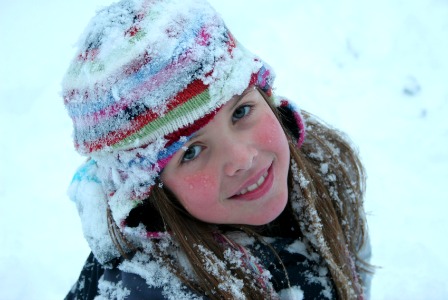
Harsh outdoor weather and indoor heating can wreak havoc on everyone’s skin, including your children's skin. Here’s how to tell if it’s simply dry skin or if you need to take your little one to get checked out by a healthcare professional.
Just dry and itchy,
or is it eczema?
Winter can mean dry skin for you or your kids. Eczema, while it is a year-round problem for many, often flares up when the weather grows cold. How can you tell the difference, and what can you do at home to relieve the symptoms?
Dry skin or eczema?
Eczema is a chronic allergic condition also known as atopic dermatitis. Those who suffer from it are familiar with its telltale symptoms of itchy, scaly, oozing rashes. However, for those who aren’t on a first-name basis with eczema, it can be a bit of a mystery when confronted with dry skin.
 Cammi Balleck, Ph.D., who works as a naturopath and has 10 years of experience, shared tips on what to look for if your child complains of dry, itchy skin. “Dry skin will have a white or gray tint to it,” she explained. “It itches in the winter more and may cause cracking of the skin. If it is raised, itchy, or oozing patches on the skin, you child may have eczema."
Cammi Balleck, Ph.D., who works as a naturopath and has 10 years of experience, shared tips on what to look for if your child complains of dry, itchy skin. “Dry skin will have a white or gray tint to it,” she explained. “It itches in the winter more and may cause cracking of the skin. If it is raised, itchy, or oozing patches on the skin, you child may have eczema."
Eczema is closely related to — and will often accompany — other allergic conditions, such as asthma, hay fever and food allergies. It can also be triggered by topical substances that are present in your home or your daily routine, such as lotion, certain soaps, detergents, dust and animal hair. “Eczema is also worsened by dry climates, exposure to water, temperature changes and stress,” Dr. Balleck said.
Treating at home
If your child has symptoms of dry skin or eczema, there are a few things that Dr. Balleck suggests that you can try at home. “Coconut cooking oil or aloe vera gel are the best topical tricks I know,” she told us.
“They work great applied as lotion to keep skin moist. However like any skin condition, eczema should not only be treated with topicals, but you also need to fix it from the inside out.”
She also suggests that your child try an anti-inflammatory diet by eliminating all dairy milk and all milk products, which may irritate the immune system and liver. You should try coconut or almond products as a good substitute . Also, keep in mind that skin disorders are often strongly linked to psychological stress; conversely, stress-relieving techniques can often be extraordinarily effective in providing relief. She also suggests that your child take a kids’ probiotic to strengthen the immune system and help the digestive system.
When to get help
If your child’s eczema doesn’t improve, you might consider getting an allergy panel done to both foods and environmental allergens — and based on those results, you will often find that removing exposure to the allergens provides relief. Dr. Balleck recommends a noninvasive saliva test, or you can go the traditional blood or skin prick test route.
If the eczema is severe, your child may be prescribed a steroid regimen to reduce inflammation. You’ll want to monitor her for signs of infection, however — look for increased redness, bleeding, white or yellow pus, pain or swelling of affected area, fever with the rash or blisters. Any sign of trouble like that warrants a call to your doctor.
With these tips in mind, relief will hopefully come your way — and you can banish dry skin from your home for winter, for good.
More on winter and kids
Winter skin care for kids
Winter health and safety tips for kids
Keep kids active in the winter